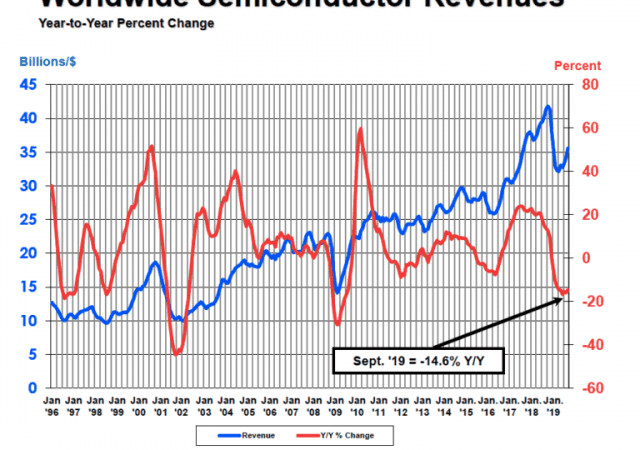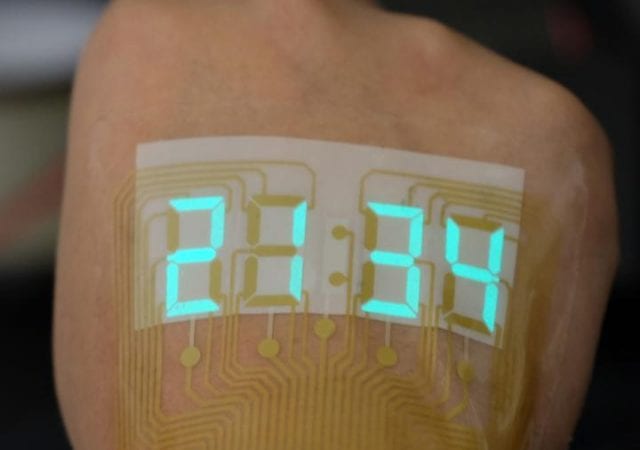Broadcom Inc. (NASDAQ: AVGO), a global technology leader that designs, develops and supplies semiconductor and infrastructure software solutions, today announced that it has completed its acquisition of the Enterprise Security business of Symantec Corporation (NASDAQ: SYMC). Symantec’s Enterprise Security business will now operate as the Symantec Enterprise division of Broadcom and will be led by Art Gilliland as SVP and General Manager.
Global Semiconductor Sales Increase 3.4 Percent Month-to-Month in September
The Semiconductor Industry Association (SIA) today announced worldwide sales of semiconductors reached $106.7 billion during the third quarter of 2019, an increase of 8.2 percent over the previous quarter and 14.6 percent less than the third quarter of 2018.
Boston Semi Equipment Revolutionizes Handling of Multi-Port, Low Pressure MEMS Sensors
Boston Semi Equipment (BSE), a global semiconductor test handler manufacturer and an innovative provider of test automation technical services, announced today that it has enhanced its Zeus gravity feed handlers with the capability of handling extremely low pressure MEMS devices with multiple ports. The first to benefit from this new MEMS handling capability is a leading manufacturer of health monitoring systems who selected BSE’s Zeus pressure MEMS solution for the ability to provide the extremely low-pressure stimulus combined with higher throughput. The Zeus MEMS handler is faster, more economical, and requires significantly less floor space than their existing solution.
Scientists Spy Unstable Semiconductors
Scientists from Cardiff University have, for the first time, spotted previously unseen “instabilities” on the surface of a common compound semiconductor material. The findings could potentially have profound consequences for the development of future materials in the electronic devices that power our daily lives.
New Technique Lets Researchers Map Strain in Next-Gen Solar Cells
People can be good at hiding strain, and we’re not alone. Solar cells have the same talent. For a solar cell, physical strain within its microscopic crystalline structure can interrupt its core function — converting sunlight into electricity — by essentially “losing” energy as heat. For an emerging type of solar cell, known as lead halide perovskites, reducing and taming this loss is key to improving efficiency and putting the perovskites on par with today’s silicon solar cells.In order to understand where strain builds up within a solar cell and triggers the energy loss, scientists must visualize the underlying grain structure of perovskite crystals within the solar cell. But the best approach involves bombarding the solar cell with high-energy electrons, which essentially burns the solar cell and renders it useless.
Gigaphoton Establishes New Company in China
Gigaphoton Inc. (Head Office: Oyama, Tochigi; President & CEO: Katsumi Uranaka), a manufacturer of light sources used in semiconductor lithography, announced the establishment and start of business for a new company GIGAPHOTON CHINA Inc. in China. Up until now, Gigaphoton’s service support in China has been conducted by Komatsu Industries Shanghai Ltd.’s optical machinery division. To expand business in China and strengthen governance, Gigaphoton China Inc. has been established as a subsidiary of Komatsu China Ltd., the regional headquarters of Komatsu, which is the parent company of Gigaphoton. Effective November 1, control of operations is transferred from Komatsu Industries Shanghai Ltd. to Gigaphoton China Inc.
Preventing Yield Losses a Key Topic of Critical Materials Council Meetings and Seminar
At the recently concluded TECHCET Critical Materials Council (CMC) Seminar in Taoyuan, Taiwan, a diverse gathering of industry experts discussed materials value-chain topics including quality issues, logistics best practices, and geopolitical disruptions. Seminar participants included individuals from device makers, material suppliers, and equipment and component providers from China, Europe, Japan, South Korea, Taiwan, and the U.S.
TSMC and UMC Deals Conclude the First Wave of Innovative Foundry Technologies’ Foundry Licensing Program
Innovative Foundry Technologies LLC (IFT) announced today that it has resolved patent litigation with Taiwan Semiconductor Manufacturing Company (TSMC) and United Microelectronics Corporation (UMC), which now triggers the beginning of the second wave of IFT’s foundry licensing program. The first wave of IFT’s multinational licensing program focused on TSMC and UMC in Germany, China and the United States. IFT launched this first wave in December 2018, when it initiated suit against Texas Instruments (TI), Volkswagen, and Ford in Dusseldorf, Germany, based on their use of UMC-manufactured OMAP processors, which IFT alleged infringe its patented technology. IFT later added UMC to the Dusseldorf action in August 2019.
Renesas Builds New RE Family for Energy Harvesting
Renesas Electronics Corporation (TSE:6723), a premier supplier of advanced semiconductor solutions, today introduced its RE Family, which encompasses the company’s current and future lineup of energy harvesting embedded controllers. The RE Family is based on Renesas’ proprietary SOTB™ (Silicon on Thin Buried Oxide) process technology, which dramatically reduces power consumption in both the active and standby states, eliminating the need for battery replacement or recharging.
A Stretchable Stopwatch Lights Up Human Skin
Imagine a runner who doesn’t need to carry a stopwatch or cell phone to check her time: She could just gaze at the glowing stopwatch display on the back of her hand. Such human-machine interfaces are no longer science fiction, but they still have a way to go before becoming mainstream. Now, researchers reporting in ACS Materials Letters have developed a stretchable light-emitting device that operates at low voltages and is safe for human skin.

